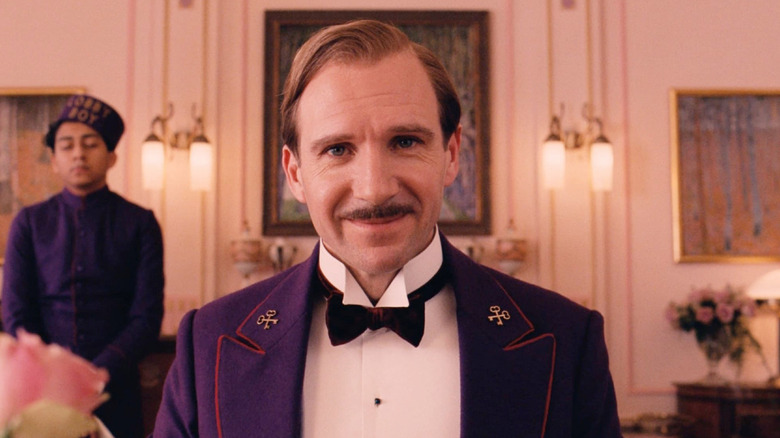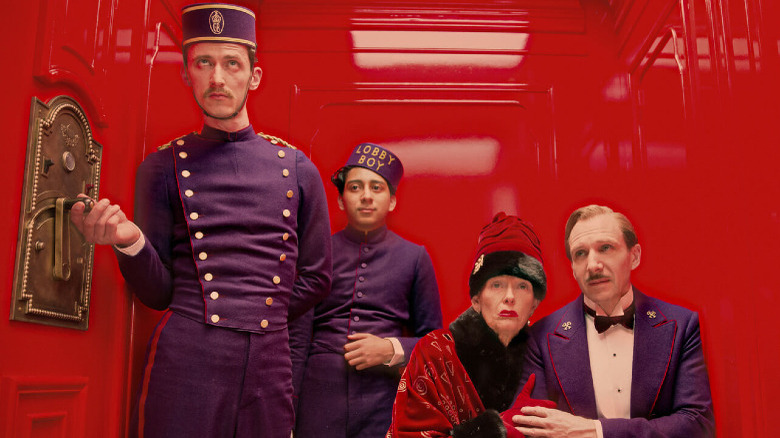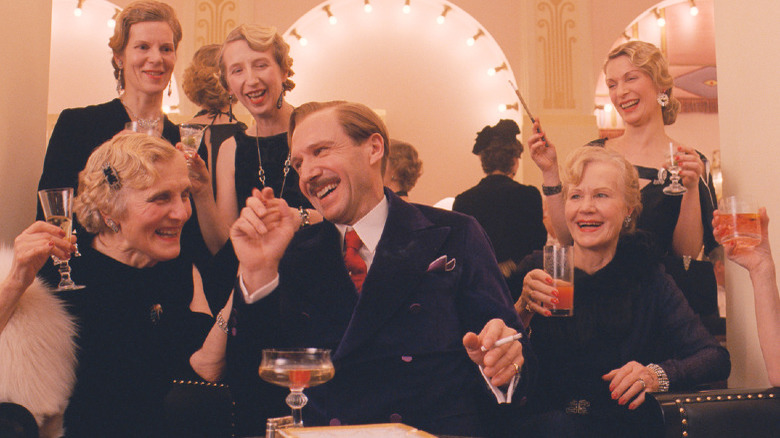The Grand Budapest Hotel Hit Close To Home For Ralph Fiennes
Wes Anderson's 2014 period dramedy "The Grand Budapest Hotel" is a fetching cinematic confection with a profound sense of sadness at its core. The movie pays homage to the work of artists like English filmmaker Alfred Hitchcock and Austrian writer Stefan Zweig, both of whom used populist genres to explore the changing social and political landscape in Europe during the 20th century. In the same way, Anderson's film examines the rise of Euro-fascism (both in the years leading up to and just after World War II) through the lens of a whimsical, irreverent, and even raunchy caper plot.
Ralph Fiennes, who was unduly snubbed by the Oscars for his performance, stars in "The Grand Budapest Hotel" as Monsieur Gustave H., the punctilious concierge who ran the titular hotel (located in the fictional European nation of Zubrowka) during its heyday in the early 20th century, his faithful lobby boy Zero Moustafa (Tony Revolori) by his side. Decades later, an older Zero (F. Murray Abraham) recounts their tale to an unnamed author (Jude Law), who then adapts their story into the book within the film, "The Grand Budapest Hotel." Knowing all this is coming from the point of view of a nostalgic elderly man also makes it easier to forgive the movie for romanticizing the old European class system.
Speaking of men of a certain age reflecting upon their humble beginnings — in a 2014 interview with the Los Angeles Times, Fiennes revealed his own real-life experience actually parallels that of the movie's characters. Like them, he too worked his way up the ranks at a ritzy establishment when he was younger, albeit in the form of a five-star hotel located in London's Mayfair district.
'The lowest of the low'
Long before he earned raves for his performances in Best Picture Oscar-winning dramas like "Schindler's List," bossed Daniel Craig's Agent 007 around in the "James Bond" films, and played a notoriously snake-nosed evil wizard, Ralph Fiennes spent his days serving world-famous actors and celebrities as a modest house porter at Brown's Hotel. Referring to himself as "the lowest of the low" among the establishment's employees, Fiennes told the LA Times, "I was basically a dogsbody for the housekeeping department — my job was to Hoover the corridors, clean the brass, change the shower curtains."
Fiennes also remembered being promoted to hall porter, which meant he got to wear the hotel's official uniform (a brown outfit with gold braid) and interact with the guests. In a separate interview with The Daily Beast from 2014, the actor elaborated on his time working at Brown's Hotel, including his brief encounters with Hollywood legend Jack Palance and the OG Spock himself, Leonard Nimoy:
"I worked in a hotel years ago, in 1982, before I went to acting college. I was working in Brown's Hotel in London, which was quite an old, well-known Mayfair hotel, and I was a House Porter. There were two of us and we had white coats and were the lowest of the low—we changed shower curtains, cleaned windows, moved furniture, helped chambermaids, and occasionally, when they were short-staffed with the uniformed porters, I was promoted to wearing a uniform and getting people out of taxis. I remember I had to take Jack Palance's suitcases to his car. He made me stand and wait as he fastidiously counted his English coins into the palm of my hand, which I found a bit humiliating. And I remember Leonard Nimoy walking underneath me as I cleaned some windows."
Gustave's backstory
By the time Zero meets Gustave in "The Grand Budapest Hotel," the latter's days working as a lobby boy are well behind him. All the same, Ralph Fiennes told the LA Times he found his experience at Brown's Hotel to be an invaluable tool for giving the character the backstory the actor needed to properly bring him to life:
"As stylized as it was, I needed to know that there was a real life behind this character. So I decided he had also been a porter, that his father had been an impoverished shoemaker and [Gustave] had caught his first glimpse of this other world when he was sent around to deliver a pair of shoes for a wealthy client."
Upon finishing college and getting into stage acting, Fiennes made his film debut starring opposite Juliette Binoche in director Peter Kosminsky's 1992 film adaptation of Emily Brontë's classic gothic novel "Wuthering Heights." He would quickly make a name for himself after that, snagging his first Oscar nod for "Schindler's List" in 1994 and then his second for "The English Patient" three years later. Fiennes has since divided his time between franchise movies and auteur projects, collaborating with the likes of David Cronenberg ("Spider"), Luca Guadagnino ("A Bigger Splash"), and the Coen Brothers ("Hail, Caesar!") along the way.
One could interpret Fiennes' work ethic (he starred in five movies released in 2021 alone) as a testament to his working-class background, combined with his obvious passion for acting. Like Gustave in "The Grand Budapest Hotel," Fiennes is clearly entranced with the world that he used to only glimpse from the outside at Brown's Hotel. Even so, it seems he's never forgotten what it was like serving the most well-known people in the world, as opposed to being one.


